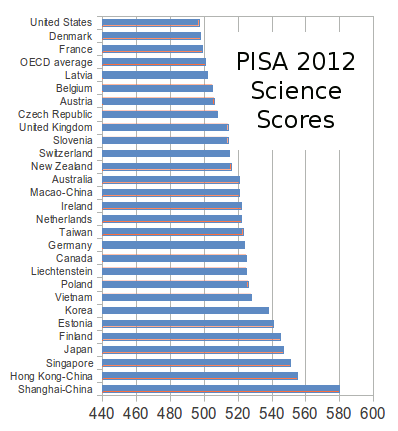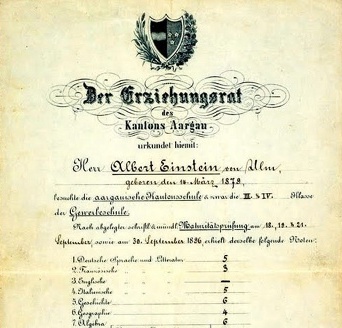
International Assessment of Science Education
December 13, 2013 There are some impressive autodidacts in many fields, and the early history of computing is replete with many examples of these. However, most people learn by going to school, some for longer periods than others; either because they need to, or because they want to. I was fortunate to have been taught by some capable scientist-professors, as have many of my readers. Students are kept on their toes by assessment exams. I would not have been inspired to learn many of the things I did were it not for the pressure of an impeding test. In those cases, my performance was tested against that of my peers. There are assessment tests in which the performance of students in a country are compared against that of students in other countries. One of these assessment tests is the Program for International Student Assessment (PISA) of the Organization for Economic Co-operation and Development (OECD). The 2012 results of that assessment have just been released.[1-5] triennial test was taken by about half a million students, aged 15 years and 3 months to 16 years and 2 months, randomly selected. In the United States, 6,000 students from 161 random schools took the test. Worldwide, there are about 28 million 15-year-old schoolchildren in the sixty-five participating countries/city-states.[1] Unlike the typical, multiple-choice, fact-based assessment tests administered to US students annually by their own schools, the questions on the PISA test are more like real-world problems. The path to the answer on the mathematics portion of the test is not a memorized formula; rather, it's a real world problem, like what automobile is the best buy based on performance vs price.[4] As a first disappointment, the 2012 US scores, which encompass the areas of reading, mathematics and science, were lower than the last test, administered in 2009.[1] As can be seen in the figure, the United States ranked 29th in science for 2012. The US score was just slightly lower than the average of all tested countries.[1] | The United States ranked 29th in science scores in the 2012 Program for International Student Assessment. This score was below average for countries whose students took the assessment test. (Graph rendered using LibreOffice from data in ref. 1.[1]) |
References:
- PISA 2012 Results, Organisation for Economic Co-operation and Development.
- Program for International Student Assessment, National Center for Education Statistics.
- Ami Sedghi, George Arnett and Mona Chalabi, "Pisa 2012 results: which country does best at reading, maths and science?" The Guardian (UK), December 3, 2013.
- Dana Goldstein, "The PISA Puzzle," Slate, December 3, 2013.
- Peter Coy, "Quick, Take This Test About the Significance of Those Bad U.S. Test Scores," Business Week, December 3, 2013.
- Kathy Tuck and Tim Walker, "Beyond PISA: How the U.S. Ranks Internationally on Five Key Education Issues," NEA Today, June 12, 2013.
- Sean Coughlan, "China: The world's cleverest country?," BBC News, May 8, 2012.
- Majority of Americans Believe Another Government Shutdown Likely in Coming Months; Last One Harmful to Medical Research, New National Poll Reveals Many Respondents Predict China will Surpass U.S. in Science and Innovation by 2020, Research America Press Release, December 3, 2013.
- Program for International Student Assessment, National Center for Education Statistics.
